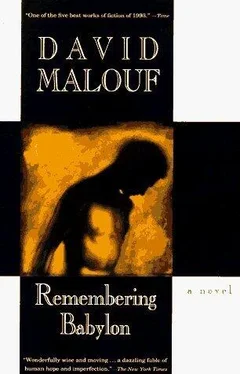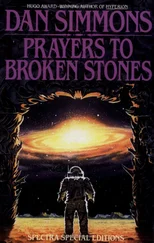David Malouf
Remembering Babylon
In the mid-1840s, thirteen-year-old Gemmy Fairley is cast ashore in the far north of Australia and taken in by Aboriginals. Sixteen years later, when settlers reach the area, he moves back into the world of Europeans.
Given shelter by the McIvors, Gemmy seems at first to be guaranteed a secure role in the settlement, but there are currents of fear and mistrust in the air. Remembering Babylon is the story of a boy caught between two worlds from David Malouf, the prize-winning author of The Great World .
Whether this is Jerusalem or Babylon we know not.
WILLIAM BLAKE: The Four Zoas
Strange shapes and void afflict the soul
And shadow to the eye
A world on fire while smoke seas roll
And lightnings rend the sky
The moon shall be as blood the sun
Black as a thunder cloud
The stars shall turn to blue and dun
And heaven by darkness bowed
Shall make sun dark and give no day
When stars like skys shall be
When heaven and earth shall pass away
Wilt thou Remember me
JOHN CLARE
ONE DAY IN the middle of the nineteenth century, when settlement in Queensland had advanced little more than halfway up the coast, three children were playing at the edge of a paddock when they saw something extraordinary. They were two little girls in patched gingham and a boy, their cousin, in short pants and braces, all three barefooted farm children not easily scared.
They had little opportunity for play but had been engaged for the past hour in a game of the boy’s devising: the paddock, all clay-packed stones and ant trails, was a forest in Russia — they were hunters on the track of wolves.
The boy had elaborated this scrap of make-believe out of a story in the fourth grade Reader; he was lost in it. Cold air burned his nostrils, snow squeaked underfoot; the gun he carried, a good sized stick, hung heavy on his arm. But the girls, especially Janet, who was older than he was and half a head taller, were bored. They had no experience of snow, and wolves did not interest them. They complained and dawdled and he had to exert all his gift for fantasy, his will too, which was stubborn, to keep them in the game.
They had a blue kelpie with them. He bounced along with his tongue lolling, excited by the boy’s solemn concentration but puzzled too that he could get no sense of what they were after: the idea of wolf had not been transmitted to him. He danced around the little party, sometimes in front, sometimes to the side, sniffing close to the earth, raising his moist eyes in hope of instruction, and every now and then, since he was young and easily distracted, bounding away after the clippered insects that sprang up as they approached, or a grasshopper that rose with a ponderous whirring and rolled sideways from his jaws. Then suddenly he did get the scent. With a yelp of pure delight he shot off in the direction of their boundary fence, and the children, all three, turned away to see what he had found.
Lachlan Beattie felt the snow melt at his feet. He heard a faint far-off rushing, like wind rolling down a tunnel, and it took him a moment to understand that it was coming from inside him.
In the intense heat that made everything you looked at warp and glare, a fragment of ti-tree swamp, some bit of the land over there that was forbidden to them, had detached itself from the band of grey that made up the far side of the swamp, and in a shape more like a watery, heat-struck mirage than a thing of substance, elongated and airily indistinct, was bowling, leaping, flying towards them.
A black! That was the boy’s first thought. We’re being raided by blacks. After so many false alarms it had come.
The two little girls stood spellbound. They had given a gasp, one sharp intake of breath, then forgotten to breathe out. The boy too was struck but had begun to recover. Though he was very pale about the mouth, he did what his manhood required him to do. Holding fast to the stick, he stepped resolutely in front.
But it wasn’t a raid, there was just one of them; and the thing, as far as he could make it out through the sweat in his eyes and its flamelike flickering, was not even, maybe, human. The stick-like legs, all knobbed at the joints, suggested a wounded waterbird, a brolga, or a human that in the manner of the tales they told one another, all spells and curses, had been changed into a bird, but only halfway, and now, neither one thing nor the other, was hopping and flapping towards them out of a world over there, beyond the no-man’s-land of the swamp, that was the abode of everything savage and fearsome, and since it lay so far beyond experience, not just their own but their parents’ too, of nightmare rumours, superstitions and all that belonged to Absolute Dark.
A bit of blue rag was at its middle from which sleeves hung down. They swung and signalled. But the sticks of arms above its head were also signalling, or beating off flies, or licks of invisible flame. Ah, that was it. It was a scarecrow that had somehow caught the spark of life, got down from its pole, and now, in a raggedy, rough-headed way, was stumbling about over the blazing earth, its leathery face scorched black, but with hair, they saw, as it bore down upon them, as sun-bleached and pale-straw coloured as their own.
Whatever it was, it was the boy’s intention to confront it. Very sturdy and purposeful, two paces in front of his cousins, though it might have been a hundred yards in the tremendous isolation he felt, and with a belief in the power of the weapon he held that he knew was impossible and might not endure, he pushed the stick into his shoulder and took his stance.
The creature, almost upon them now and with Flash at its heels, came to a halt, gave a kind of squawk, and leaping up onto the top rail of the fence, hung there, its arms outflung as if preparing for flight. Then the ragged mouth gapped.
‘Do not shoot,’ it shouted. ‘I am a B-b-british object!’
It was a white man, though there was no way you could have known it from his look. He had the mangy, half-starved look of a black, and when, with a cry, he lost his grip on the rail and came tumbling at their feet, the smell of one too, like dead swamp-water; and must have been as astonished as they were by the words that had jumped out of his mouth because he could find no more of them. He gaped, grinned, rubbed his side, winced, cast his eyes about in a hopeless way, and when he found speech again it was a complaint, against himself perhaps, in some whining blackfeller’s lingo.
The boy was incensed. The idea of a language he did not know scared him. He thought that if he allowed the man to go on using it, he would see how weak they were and get the advantage of them. He jerked the stick in the direction of the man’s heart. ‘Stop that,’ he yelled. ‘Just steik yur mooth.’
The man, responding to the truculence of the boy’s tone, began to crawl about with his nose in the dust. The boy relaxed — That’s better, he thought — and even Flash, seeing now that the fellow was prepared to be docile, stopped yapping and began to tongue the stranger’s knees.
The man was not keen on it. With a childish whimper he began to hop about, trying to shake the dog off. Lachlan, disturbed and a little disgusted by this display of unmanliness but eager to show that he could be a generous victor, as well as a stern one, called Flash off. ‘Ge on wi’ ye,’ he told the fellow in as gruff a voice as he could manage, and soon had his prisoner going, but at a hobbling gait — one of his legs was shorter than the other. He ordered his cousins to keep back, and in the glow of his new-found mastery they let themselves be led.
Читать дальше












